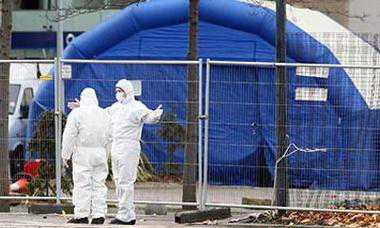 A mini-pogrom in Ulster has shocked Britain. But a legal battle with the far right is brewing on the mainland.
A mini-pogrom in Ulster has shocked Britain. But a legal battle with the far right is brewing on the mainland.
RACIST bogeymen leered out of newspaper pages in both Britain and Northern Ireland this week. On the mainland, the far-right British National Party (BNP), which won its first two seats in the European Parliament earlier this month, was given an ultimatum by Britain’s equality watchdog to step in line with non-discrimination laws or face legal action. Separately, white thugs in Ulster hounded more than a hundred Romanian immigrants—mainly Roma gypsies—out of their homes and, in most cases it now seems, away from the province altogether.
The attacks in south Belfast were of the sort that Northern Ireland hoped had died with the Troubles. Over several nights crowds stoned the homes of immigrant families, smashing windows and posting extracts of Mein Kampf through letterboxes. Tension between locals and east European immigrants had simmered since football hooligans clashed at a match between Poland and Northern Ireland in March. When the intimidation reached a peak on June 16th, the Romanians were moved to a church hall and then to a leisure centre. On June 23rd Northern Ireland’s government announced that most had decided to return to Romania.
Northern Ireland elected no far-right politicians to the European Parliament in the polling on June 4th. Nonetheless, many in Britain reckon that their neighbours over the water are a more prejudiced bunch than they are themselves. Socially, Ulster leans to the right: civil partnerships, greeted with a shrug by most British Tories, attracted protests in Belfast when they were introduced in 2005; abortion is also more restricted than on the mainland.
It may be that these conservative attitudes extend to scepticism about outsiders. A survey published on June 24th by Northern Ireland’s Equality Commission, a statutory watchdog, found that nearly a quarter of the population would be unhappy if a migrant worker moved in next-door. People were even more hostile to Irish travellers, sometimes called gypsies (and often confused with Roma). Just over half said they would mind having travellers living next to them.
Comparing these results with the rest of Britain is hard because surveys produce different answers according to how a question is worded. Across the United Kingdom, less than a tenth of whites say they would mind having a black or Asian boss (though nearly a third admit to being at least “a little” racially prejudiced). But the trends on the mainland and in Ulster are in sharp contrast. British hang-ups about minorities have fallen pretty steadily over the past 20 years, according to the British Social Attitudes Survey, a big questionnaire. By contrast, Northern Irish dislike of travellers is up by a quarter from 2005.
Yet sectarian tensions in Northern Ireland are relatively low. Only 6% now say they would mind having a neighbour of a different faith. One theory goes that the fizzling out of the old disputes has helped to stoke other ones. “The attitudes that facilitate sectarianism may find new outlets in new times,” suggested Bob Collins, the head of the commission. Immigrants are not the only victims: anti-gay sentiment, falling across Britain, has gone up by more than half in Northern Ireland since 2005.
Glass houses
The election of a man with a conviction for inciting race hatred to represent northern England in the European Parliament spoils any pretty notion that all is well on the mainland. But the selection of Nick Griffin, the leader of the BNP, and his colleague Andrew Brons, a former National Front chairman, has provoked a legal challenge from the Equality and Human Rights Commission (EHRC), a mega-watchdog.
The EHRC wrote to Mr Griffin on June 23rd that it believed the BNP fell foul of the law in its race-based membership policy, its hiring (which appears to be restricted to party members) and what the EHRC interpreted as hints that the party would not provide an equal service to constituents of all races. Unless the BNP changes its ways by July 20th, the watchdog will seek a court order to force it to; if the party held that in contempt it could face fines, imprisonment—and publicity.
Why pounce now? First, the EHRC was born only in 2007. Its predecessor, the Commission for Racial Equality, lacked the power to pursue this sort of independent legal challenge. Second, the law has been clarified: the law lords ruled in November 2007 that certain functions of political parties are indeed subject to the Race Relations Act of 1976, which had been in doubt.
Most obviously, the action was triggered by the electoral success of the BNP which, coupled with talk in Westminster about voting reform likely to benefit small parties, has made it harder to dismiss as a sideshow. Others have moved against the BNP since the election: the Royal British Legion, a veterans’ group, publicly called on Mr Griffin to stop wearing its poppy emblem; the government is pondering banning BNP members from teaching, just as they are already banned from the police and prison services. A forthcoming bill on equal opportunities is expected to include a clause explicitly to stop the BNP and its ilk from insisting on race-based membership.
If the EHRC’s complaint goes to court, it will not be the first time a case against a political party has tested race-relations laws. The 1976 act followed a House of Lords ruling in 1973 upholding the right of East Ham South Conservative Club to ban a Sikh because of his race. And the 2007 Lords’ ruling that has clarified the grounds for the EHRC’s current case was over a complaint by a Pakistani man—upheld by their lordships—against the Labour Party.
Economist





